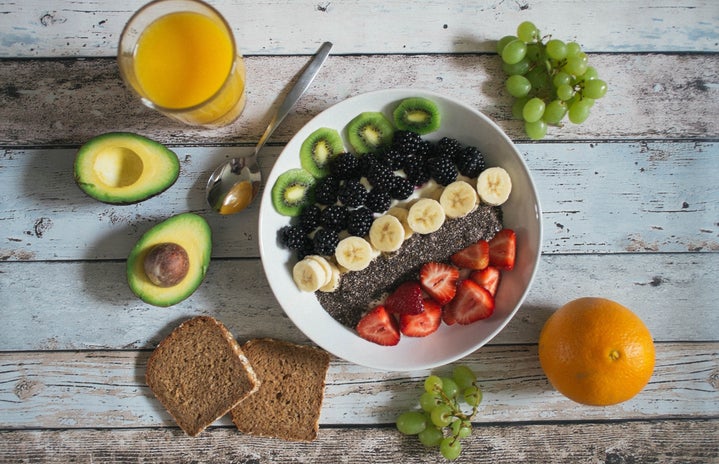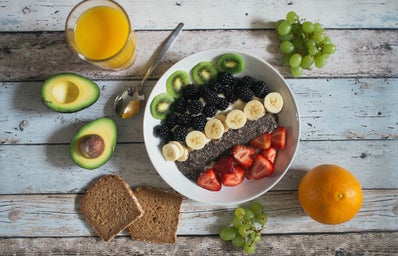I remember feeling off about my gut health beginning in middle school. The pains I had after eating felt out of control, and I began to feel that I was missing out on life because of these so-called “womanly pains.” After trying doctor after doctor with no luck or validation, I turned to holistic medicine as a last resort to solve my mystery stomach aches.
Sara Peternell is no stranger to struggles with gut health. Peternell is board-certified in Holistic Nutrition and has been working in the nutrition industry for over 20 years. “I do work with all kinds of people who are just interested in learning about better nutritional health and how to customize and individualize that for them.”
After not finding personal success with western medicine and struggling with two genetic autoimmune diseases, Peternell began to explore her own gut health through holistic practices. “‘It’s all in your head,’ I mean, I’ve heard that so many times,” said Peternell of her experiences with western doctors, “it’s really important for women, especially for young women, if they are experiencing a health problem, to go against the medical establishment.” She explained that there isn’t just one way to experience a health journey, even if that was the narrative that had been pushed on her by traditional health professionals. Through the help of her personal education journey and the advice of many mentors in the holistic health field, Petenell learned that “there was more than just one way to do it” and began her mission to heal herself and others.
The growing industry of gut health has taken off in the past five years. While we can credit this to social media, we also need to acknowledge the health workers like Peternell who have created space for nutrition in the health sphere. “Nutrition has taken a bit of an elevated seat,” said Peternell, “but I think a misconception about nutrition is that nutrition can’t really heal.” Peternell has encountered many clients and healthcare professionals who are still not wholly convinced of the healing powers of food. “I actually believe, based on my training, based on my years of experiences, based on the thousands of clients that I’ve worked with, that nutrition is the primary healing modality and that everything else around it is support for nutrition,” she said of this misconception, “a car can’t go without gas, it has to have a fuel source,” and our bodies are the same way. To Peternell, food is magic, but the magic is deeply personal and specific to each individual person. “There’s so much magic in plant food, and in animal food too, and that magic is the stuff we’ll never be able to identify. That’s because food for me is different from food for you,” she says. Finding what food works magically for you comes down to what feels good and nourishing. This identification is not a one size fits all tactic, what might feel amazing and fueling to you could cause a sickening reaction in me.
While Sara doesn’t believe that you can capture the magic of food in capsules or supplements, she understands that “we often need to supplement even a very healthy diet.” She cautioned away from self-supplementing, saying that you shouldn’t begin taking whatever latest concoction you found on Doctor Oz or Shape Magazine, “that’s the wrong way to approach it for a couple of reasons.” She raised the concern of these self-adopted supplements as not being individualized and thus running the risk of creating further imbalances in the body. Additionally, there is a wide range of quality at which these supplements are produced. Speaking to someone like Sara allows individuals to ensure they are fueling their bodies properly and with quality goods. “There’s no one size fits all answer, and you don’t have to take supplements forever,” said Sara. She explained the various supplements you may need for the ever-changing phases of life. Someone who was once a young athlete in need of B12 might grow to be more focused on fertility. These interests and circumstances require a different approach to supplements. Her final thoughts on supplements were that “you can’t out-supplement a bad diet, and you also can’t take supplements and have them work for you if you have deeper underlying root cause issues that haven’t been addressed, gut health being one of those issues.” She emphasized the importance of following a certain order and process that is crucial to cleaning up your diet and your gut.
For Sara, there are no “good” or “bad” foods. “We should look at food as fuel and then look at how our body responds to that fuel as information about whether or not that’s a good fuel for us,” she says of this common classification. She advises looking at your meals objectively, scientifically, and with a welcoming curiosity in order to eliminate the idea of foods as inherently “good” or “bad.” Food choices are deeply individual and should be treated as experiences. Sara even spoke of the merits of food that may even be considered objectively “bad.” She mentioned the mental health and wellness benefits of eating favorite childhood meals or desserts that connect you to loved ones. “There’s really no black or white when it comes to good or bad food… we should just use food as fuel and information for how to move forward.”
“I think I wish I would have known that food actually matters,” Sara said when asked to reflect on health advice she would have given herself in college, “you’re not going to put crappy gasoline in your car if what you need is premium.” She also emphasized that “hydration matters” and that you will only benefit from replenishing your body with plenty of water and electrolytes, which help your body absorb water every day. Beyond just food, Sara said she wished she knew to “trust your body, listen to your body, and not to doubt your body.” After working with countless doctors and medical professionals who made her feel silly for her complaints, she is now confident that taking control of your health is a right. “Every woman is entitled to that process without being made to feel foolish or high maintenance” and that women should feel empowered to demand “a multi-faceted, in-depth, scientific approach coupled with some prayer, some journaling, or some guidance on how to tackle your health.”
As college students, focusing on our health feels like it is giving up a huge part of what makes this phase of life so fun. I want to be healthy and feel good, but I also want to eat pizza at 3 a.m. with my best friends on our walk home from the bars. “Keep in mind that living joyfully is a huge part of being healthy,” said Peternell of this dilemma. She advises that we avoid beating ourselves up over a night out and we affirm to ourselves that “I’m going to make choices that I 100% accept and embrace and I’m not going to feel bad about it. This is literally just a piece of living and I’m not going to change anything after the fact unless I really need to do that… Own it! When we own our choices, the consequences are so much less severe.”
Working with Sara has been life-changing for me in so many ways. Not only have I been empowered to take control of my health in a meaningful way, but I’ve been encouraged to dig deeper, own my choices, and create a life that I am proud of with health, and all the many meanings of that word, as the grounding force. If you want to get to know more about Sara’s practice, visit her website, follow her on Instagram, and watch her free educational videos on health and self-care.


